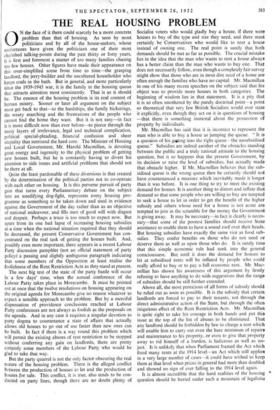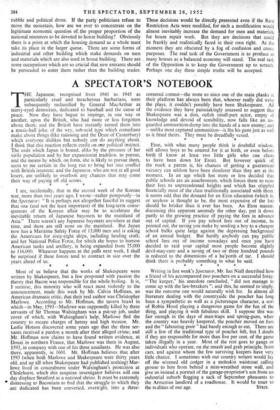THE REAL HOUSING PROBLEM
0 N the face of it there could scarcely be a more concrete problem than that of housing. As seen by most politicians and by all of the house-seekers, whose misfortunes have given the politician§ one of their most cherished talking-points during the past thirty or forty years, it is first and foremost a matter of too many families chasing too few houses. Other figures have made their appearance on this over-simplified scene from time to time—the grasping landlord, the jerry-builder and the uncultured householder who keeps coals in the bath. But in general, and more particularly since the 1939-1945 war, it is the family in the housing queue that attracts attention most consistently. That is as it should be. The essence of the housing problem is its real content of human misery. Sooner or later all argument on the subject must get back to that—to the hardships, the family bickerings, the weary searching and the frustrations of the people who cannot find the home they want. But it is not easy—in fact it is more difficult now than ever before—to pierce through the many layers of irrelevance, legal and technical complication, political special-pleading, financial confusion and sheer stupidity that surround the hard core. The Minister of Housing and Local Government, Mr. Harold Macmillan, is devoting great energy and ingenuity to the physical problem of getting new houses built, but he is constantly having to divert his attention to side issues and artificial problems that should not be there at all.
Quite the least pardonable of these diversions is that created by the determination of the political parties not to co-operate with each other on housing. It is this perverse pursuit of party gain that turns every Parliamentary debate on the subject into an unedifying dog-fight, represents every housing pro- gramme as something to be taken down and used in evidence against the Government of the day rather than as an objective of national endeavour, and fills men of good will with disgust and despair. Perhaps a truce is too much to expect now. But apart from its one bad lapse of increasing housing subsidies at a time when the national situation required that they should be decreased, the present Conservative Government has con- centrated on the real task of getting the houses built. And, possibly even more important, there appears in a recent Labour Party discussion pamphlet (not an official statement of party policy) a passing and slightly ambiguous paragraph indicating that some members of the Opposition at least realise the foolishness of the Rent Restriction Acts as they stand at present.
The next big test of the state of the party battle will occur in a few days' time, when the annual conference of the Labour Party takes place in Morecambe. It must be pointed out at once that the twelve resolutions on housing appearing on the original agenda for Morecambe give no reason whatever to expect a sensible approach to the problem. But by a merciful dispensation of providence conclusions reached at Labour Party conferences are not always as foolish as the proposals on the agenda. And in any case it requires a singular devotion to party dogma to countenance a state of affairs that actually. allows old houses to go out of use faster than new ones can be built. In fact if there is a way round this problem which will permit the existing abuses of rent restriction to be stopped without conferring any gain on landlords, there are pretty certainly some members of the Labour Party who would be glad to take that way.
But the party quarrel is not the only factor obscuring the real nature of the housing problem. There is the alleged conflict between the production of houses to let and the production of houses for sale. This conflict, it is true, also tends to be con- ducted on party lines, though there are no doubt plenty of Socialist voters who would gladly buy a house, if there were houses to buy of the type and size they need, and there must certainly be Conservatives who would like to rent a house instead of owning one. The real point is surely that both demands should be met as far as possible. The crucial mistake lies in the idea that the man who wants to rent a house always has a better claim than the man who wants to buy one. That does not necessarily follow, even though a completely fair survey might show that those who are in most dire need of a home are often enough the families who have no capital. Mr. Macmillan in one of his many recent speeches on the subject said that his object was to provide more houses in both categories. The beginning of wisdom lies in that statement. It is a pity that it is so often smothered by the purely doctrinal point—a point so theoretical that very few British Socialists would ever state it explicitly, even though they act on it in questions of housing —that there is something immoral about the possession of property by individuals.
Mr. Macmillan has said that it is incorrect to represent the man who is able to buy a house as jumping the queue. " It is a question of his getting into the right queue—the unsubsidised queue." Subsidies are indeed another of the obstacles standing between the public and a truly rational attitude to the housing question, but it so happens that the present Government, by its decision to raise the level of subsidies, has actually made that obstacle higher. If Mr. Macmillan believes that the sub- sidised queue is the wrong queue then he certainly should not have countenanced a measure which inevitably made it longer than it was before. It is one thing to try to meet the existing demand for houses. It is another thing to distort and inflate that demand so that some people who are willing to buy are tempted to seek a house to let in order to get the benefit of the higher subsidy and others whose need for a house is not acute are tempted to join in the scramble for the money the Government is giving away. It may be necessary—in fact it clearly is neces- sary—that some of the poorest families should receive State assistance to enable them to have a sound roof over their heads. But housing subsidies have exactly the same vice as food sub- sidies. They confer benefits on those who do not need or deserve them as well as upon those who do. It is surely time that this simple economic rule had sunk into the general consciousness. But until it does the demand for houses to let at subsidised rents will be inflated by people who could really afford to buy or to pay a full economic rent. Mr. Mac- millan has shown his awareness of this argument by firmly refusing to have anything to do with suggestions that the range of subsidies should be still further extended.
Above all, the most pernicious of all forms of subsidy should be ruled out as soon as possible. It is the subsidy that certain landlords are forced to pay to their tenants, not through the direct administrative action of the State, but through the often iniquitous effect of the Rent Restriction Acts. Mr. Macmillan is quite right to take his courage in both hands and put this issue at the top of the list of abuses to be eliminated. That any landlord should be forbidden by law to charge a rent which will enable him to carry out even the bare minimum of repairs and maintenance to his property, or even to give that property away to rid himself of a burden, is ludicrous as well as un- just. It is unlikely that when Parliament framed the Act which fixed many rents at the 1914 level—an Act which still applies in a very large number of cases—it could have wished to keep them at that level when prices in general had more than doubled and showed no sign of ever falling to the 1914 level again.
It is almost incredible that the hard realities of the housing question should be buried under such a mountain of legalistic rubble and political dross. If the party politicians refuse to move the mountain, how are we ever to concentrate on the legitimate economic question of_the proper proportion of the national resources to be devoted to house building? Obviously there is a point at which the housing demand as a whole must take its place in the larger queue.. There are some forms of industrial and other building which make demands on men and materials which are also used in house building. There are some occupations which are so crucial that new entrants should be persuaded to enter them rather than the building trades. These decisions would be directly presented even if the Rent Restriction Acts were modified, for such a modification would almost inevitably increase the demand for men and materials for house repair work. But they are decisions that could be frankly and realistically faced in their own right. At the moment -they are obscured by a fog of confusion and cross- purposes. The real task of the Government is to produce as many houses as a balanced economy will stand. The real task of the Opposition is to keep the Government up to scratch. Perhaps ow. day these simple truths will be accepted.



































 Previous page
Previous page